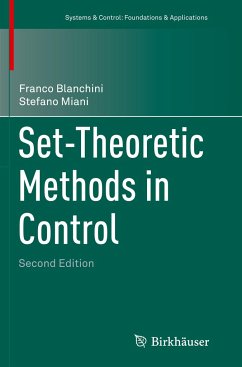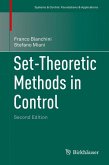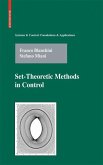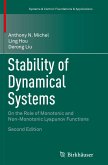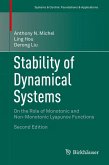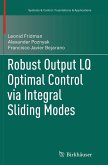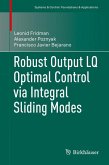The second edition of this monograph describes the set-theoretic approach for the control and analysis of dynamic systems, both from a theoretical and practical standpoint. This approach is linked to fundamental control problems, such as Lyapunov stability analysis and stabilization, optimal control, control under constraints, persistent disturbance rejection, and uncertain systems analysis and synthesis. Completely self-contained, this book provides a solid foundation of mathematical techniques and applications, extensive references to the relevant literature, and numerous avenues for further theoretical study.
All the material from the first edition has been updated to reflect the most recent developments in the field, and a new chapter on switching systems has been added. Each chapter contains examples, case studies, and exercises to allow for a better understanding of theoretical concepts by practical application. The mathematical language is kept to the minimum level necessary for the adequate formulation and statement of the main concepts, yet allowing for a detailed exposition of the numerical algorithms for the solution of the proposed problems.
Set-Theoretic Methods in Control will appeal to both researchers and practitioners in control engineering and applied mathematics. It is also well-suited as a textbook for graduate students in these areas.
Praise for the First Edition
"This is an excellent book, full of new ideas and collecting a lot of diverse material related to set-theoretic methods. It can be recommended to a wide control community audience."
- B. T. Polyak, Mathematical Reviews
"This book is an outstanding monograph of a recent research trend in control. It reflects the vast experience of the authors as well as their noticeable contributions to the development of this field...[It] is highly recommended to PhD students and researchers working in control engineering or applied mathematics. The material can also be used for graduate courses in these areas."
- Octavian Pastravanu, Zentralblatt MATH
All the material from the first edition has been updated to reflect the most recent developments in the field, and a new chapter on switching systems has been added. Each chapter contains examples, case studies, and exercises to allow for a better understanding of theoretical concepts by practical application. The mathematical language is kept to the minimum level necessary for the adequate formulation and statement of the main concepts, yet allowing for a detailed exposition of the numerical algorithms for the solution of the proposed problems.
Set-Theoretic Methods in Control will appeal to both researchers and practitioners in control engineering and applied mathematics. It is also well-suited as a textbook for graduate students in these areas.
Praise for the First Edition
"This is an excellent book, full of new ideas and collecting a lot of diverse material related to set-theoretic methods. It can be recommended to a wide control community audience."
- B. T. Polyak, Mathematical Reviews
"This book is an outstanding monograph of a recent research trend in control. It reflects the vast experience of the authors as well as their noticeable contributions to the development of this field...[It] is highly recommended to PhD students and researchers working in control engineering or applied mathematics. The material can also be used for graduate courses in these areas."
- Octavian Pastravanu, Zentralblatt MATH
"The main purpose of the book is to provide a complete presentation of the set-theoretic approach for the control and analysis of dynamic systems ... . The book contains many examples which illustrate various facets of the theory and many valuable comments on and links to the existing literature, which make the book a valuable guide to the state of art of the domain under study." (Valeriu Prepelita, Mathematical Reviews, April, 2016)
"This is an excellent book, full of new ideas and collecting a lot of diverse material related to set-theoretic methods. It can be recommended to a wide control community audience."
- B. T. Polyak, Mathematical Reviews
"This book is an outstanding monograph of a recent research trend in control. It reflects the vast experience of the authors as well as their noticeable contributions to the development of this field...[It] is highly recommended to PhD students and researchers working in control engineering or applied mathematics. The material can also be used for graduate courses in these areas."
- Octavian Pastravanu, Zentralblatt MATH
"This is an excellent book, full of new ideas and collecting a lot of diverse material related to set-theoretic methods. It can be recommended to a wide control community audience."
- B. T. Polyak, Mathematical Reviews
"This book is an outstanding monograph of a recent research trend in control. It reflects the vast experience of the authors as well as their noticeable contributions to the development of this field...[It] is highly recommended to PhD students and researchers working in control engineering or applied mathematics. The material can also be used for graduate courses in these areas."
- Octavian Pastravanu, Zentralblatt MATH
From the reviews:
"The book is an outstanding monograph of a recent research trend in control. It reflects the vast experience of the authors as well as their noticeable contributions to the development of this field...At the conceptual level, the book was meant as a self contained volume for readers with the usual background in systems and control. The text is very accessible (the style is attractive; the theoretical concepts and results are accompanied by relevant examples so as to facilitate the deep understanding of the discussed topics; both analytical and numerical approaches are presented; the final section of each chapter includes exercises). The book is highly recommended to PhD students and researchers working in control engineering or applied mathematics. The material can also be used for graduate courses in these areas." [Octavian Pastravanu, Zentralblatt MATH]
"This is an excellent book, full of new ideas and collecting a lot of diverse material related to set-theoretic methods. It can be recommended to a wide control community audience." (B. T. Polyak, Mathematical Reviews, Issue 2009 f)
"The book is an outstanding monograph of a recent research trend in control. It reflects the vast experience of the authors as well as their noticeable contributions to the development of this field...At the conceptual level, the book was meant as a self contained volume for readers with the usual background in systems and control. The text is very accessible (the style is attractive; the theoretical concepts and results are accompanied by relevant examples so as to facilitate the deep understanding of the discussed topics; both analytical and numerical approaches are presented; the final section of each chapter includes exercises). The book is highly recommended to PhD students and researchers working in control engineering or applied mathematics. The material can also be used for graduate courses in these areas." [Octavian Pastravanu, Zentralblatt MATH]
"This is an excellent book, full of new ideas and collecting a lot of diverse material related to set-theoretic methods. It can be recommended to a wide control community audience." (B. T. Polyak, Mathematical Reviews, Issue 2009 f)
"This is an excellent book, full of new ideas and collecting a lot of diverse material related to set-theoretic methods. It can be recommended to a wide control community audience." -- B. T. Polyak, Mathematical Reviews
"This book is an outstanding monograph of a recent research trend in control. It reflects the vast experience of the authors as well as their noticeable contributions to the development of this field...[It] is highly recommended to PhD students and researchers working in control engineering or applied mathematics. The material can also be used for graduate courses in these areas." -- Octavian Pastravanu, Zentralblatt MATH
"This book is an outstanding monograph of a recent research trend in control. It reflects the vast experience of the authors as well as their noticeable contributions to the development of this field...[It] is highly recommended to PhD students and researchers working in control engineering or applied mathematics. The material can also be used for graduate courses in these areas." -- Octavian Pastravanu, Zentralblatt MATH

